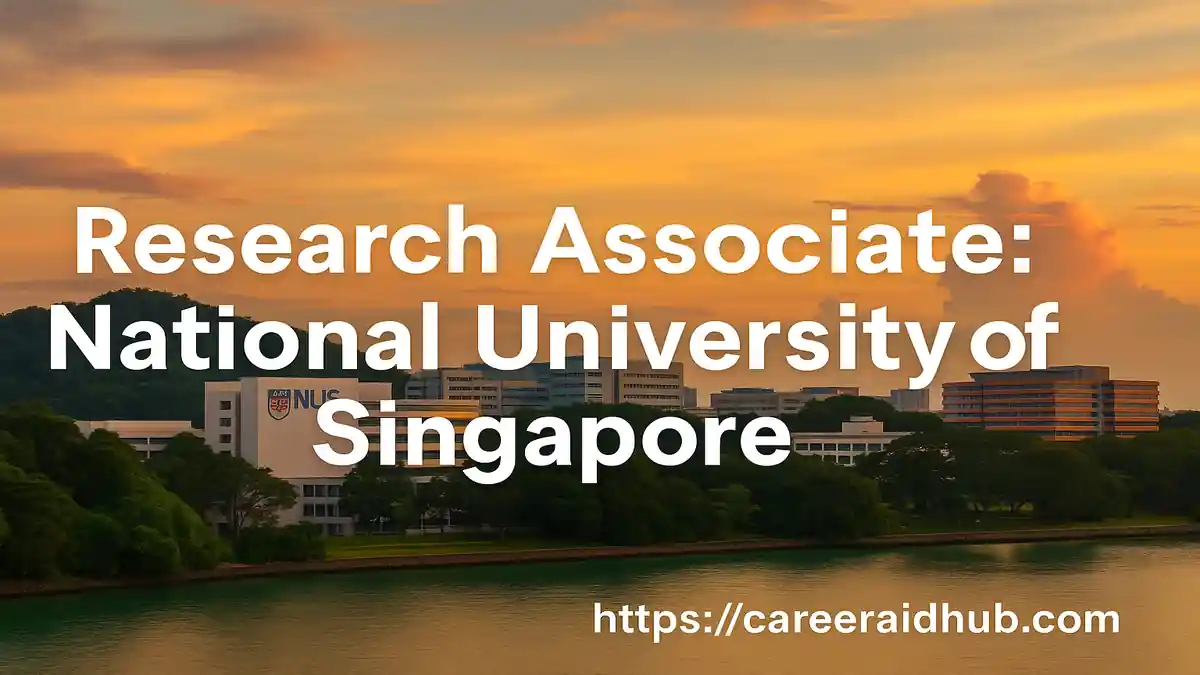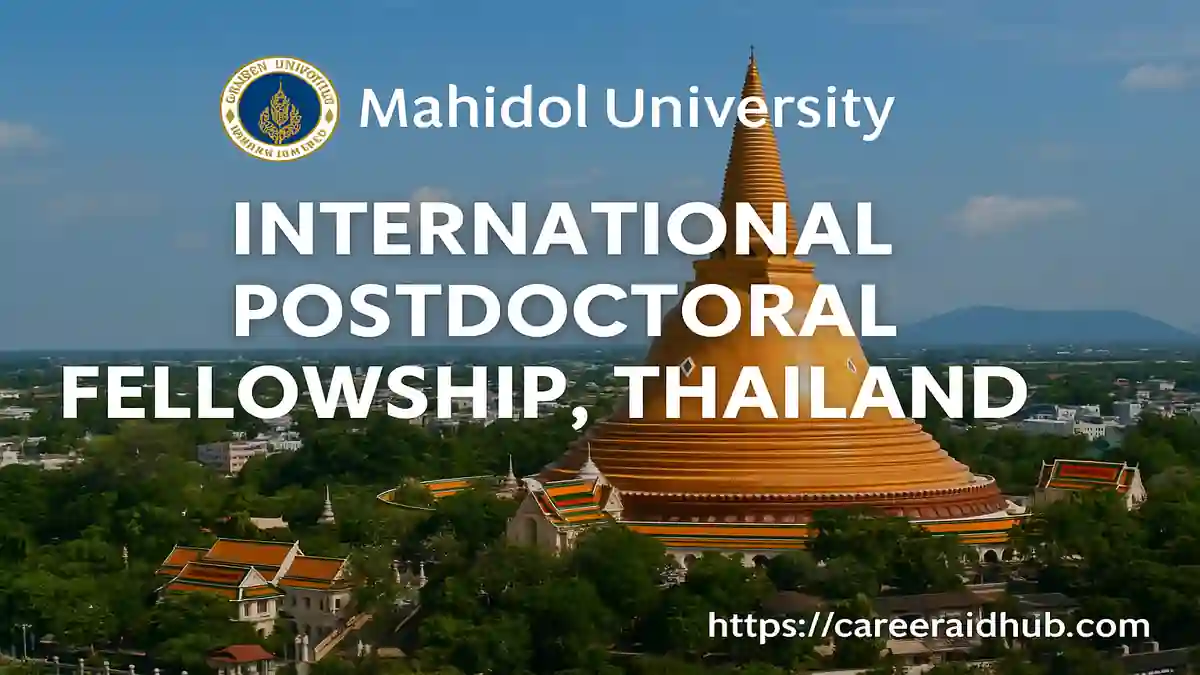Research Associate – Southeast Asian Studies Next Generation Collaboratory, ARI NUS
The Asia Research Institute (ARI) at the National University of Singapore is a leading centre for humanities and social science research on Asia. It brings together scholars working on historical and contemporary transformations, fostering interdisciplinary dialogue across disciplines, regions and methodological traditions.
Within this vibrant environment, the Southeast Asian Studies Next Generation Postdoctoral Collaboratory (SEAS-NGPC) has been established as a multi-institutional initiative to nurture the next generation of Southeast Asian studies scholars. Supported by the Luce Foundation and hosted by ARI, the Collaboratory provides structured mentoring, skills training and networking opportunities that connect postdoctoral fellows across Southeast Asia and North America.
The Research Associate position in the Southeast Asian Studies Next Generation Collaboratory at the Asia Research Institute, National University of Singapore, offers a two-year, full-time role coordinating a Luce-funded regional initiative that supports emerging Southeast Asianists through training academies, research showcases, and long-term scholarly networks.
The newly advertised Research Associate will play a central coordinating role in this initiative. Rather than acting only as an administrator, the post holder will help design, document and implement a new
Role Overview: Research Associate in ARI
The Research Associate – Southeast Asian Studies Next Generation Collaboratory is a two-year, full-time appointment based at ARI. The position runs from January 2026 to December 2027 and reports directly to Professor Maitrii Aung-Thwin, the Principal Investigator of the Collaboratory.
This is conceived as a hybrid research and project-management role. The appointee will guide the implementation of SEAS-NGPC and related projects within the broader Southeast Asian Studies Collaboratory, ensuring that activities are delivered on time, on budget and in line with both ARI and Luce Foundation expectations.
Because the Collaboratory stretches across multiple institutions in Southeast Asia and North America, the Research Associate will work closely with postdoctoral fellows, senior academics, institutional partners and funders. The role therefore demands both analytical skills and the ability to manage complex, intercultural collaborations on a daily basis.
Key Responsibilities: From Evidence to Engagement
Research and Data Management
A core strand of the job centres on research and data-driven capacity-building. The Research Associate will:
Coordinate surveys and other data-collection exercises on postdoctoral career pathways, mentoring practices and skills-training outcomes.
Help design and maintain a career pathways database, ensuring that information on fellows’ trajectories, skills
needs and institutional contexts remains up to date.Contribute to a capacity-needs assessment report and assist in turning preliminary findings into a clear, transferable implementation playbook for the Collaboratory model.
These tasks will particularly suit candidates who like working with both qualitative and quantitative evidence and who can translate findings into practical recommendations for programme design.
Project Coordination and Administration
The Research Associate will also oversee the day-to-day running of the project. Key duties include:
Developing and monitoring project timelines, milestones and deliverables, while keeping the Principal Investigator informed of progress and risks.
Managing the project budget, tracking expenditures and preparing financial documentation in line with ARI and donor requirements.
Ensuring that reporting obligations to both the Luce Foundation and NUS are met in a timely and accurate manner.
Success in this area will require careful attention to detail, strong spreadsheet skills and the confidence to coordinate tasks across different time zones and institutional cultures.
Event and Programme Management
Two flagship activities sit at the heart of the Collaboratory:
An annual, week-long Academy, which offers skills training, masterclasses and intensive mentoring.
An annual Showcase or Summit, where fellows present their work, meet senior scholars and engage with institutional stakeholders.
The
Partnership and Stakeholder Engagement
Because the Collaboratory connects ARI with partners across Southeast Asia and North America—including national resource centres, SEASREP, GETSEA and other networks—the Research Associate acts as a key liaison.
They will:
Maintain regular communication with institutional partners and ensure that expectations around joint activities are clearly aligned.
Coordinate engagement with senior scholars, journal editors, publishers and other stakeholders who contribute to the Collaboratory’s events and mentoring activities.
Build and sustain relationships with past, current and potential fellows, supporting the development of a long-term regional network in Southeast Asian Studies.
Communications and Dissemination
To maximise impact, the Collaboratory must communicate its work clearly to different audiences. The Research Associate therefore oversees:
The development and regular updating of the project website, including fellow profiles, event highlights, resource lists and publication outcomes.
The drafting of reports, policy briefs and publicity materials for ARI, NUS and the Luce Foundation.
The
documentation and sharing of Collaboratory outcomes with institutional partners and with future grantees who may adapt the model in other contexts.
Strong writing skills, an eye for layout and familiarity with basic web-content tools will be valuable in fulfilling these tasks effectively.
Qualifications and Core Competencies
Academic and Professional Background
Applicants must hold at least a Master’s degree in the humanities, social sciences or a closely related field. In addition, they should have a minimum of five years of experience in areas such as project management, academic administration or international programme coordination.
Experience working with universities or research institutes—ideally in Southeast Asian or Asian Studies—is highly desirable. Familiarity with grant-funded projects and donor reporting will be a strong advantage, given the Luce Foundation’s involvement. The role also requires excellent written and spoken English, while proficiency in at least one Southeast Asian language would be considered an asset.
Skills and Competency Profile
The vacancy notice highlights several core competencies that will guide the selection process:
Research and Data Management: Ability to design surveys, manage datasets and support the preparation of academic publications and analytical reports.
Project Management Expertise: Demonstrated success in coordinating complex projects, including budget oversight, scheduling and stakeholder management.
Administrative and Reporting Skills: Capacity to prepare grant reports, maintain compliance with institutional policies and liaise with funders.
Digital and Media Literacy: Experience maintaining websites, preparing communication materials and using online platforms for networking and outreach.
Event Planning Skills: A record of organising conferences, workshops or international meetings, including both onsite and hybrid formats.
Interpersonal and Communication Skills: Confidence working with senior academics, institutional leaders and early-career researchers in multicultural contexts.
Cross-Cultural Competence: Familiarity with higher-education environments in Southeast Asia and North America and the sensitivity to navigate varied academic cultures.
Candidates who can demonstrate most of these attributes—and who show a genuine commitment to strengthening Southeast Asian Studies—are likely to be strong contenders.
Application Process and Preparation Tips
How to Apply
Applications are accepted exclusively through the NUS online recruitment system. Prospective candidates must compile the following documents into a single PDF file and upload it under the CV section when submitting their application:
A comprehensive curriculum vitae, listing academic qualifications, professional experience and contact details for two referees willing to provide confidential references.
Academic certificates and transcripts for relevant degrees.
Review of applications begins as soon as submissions are received and will continue until a suitable candidate is appointed. Only shortlisted or successful applicants will be notified. Applications submitted by email will not be considered, although queries about the position may be sent to the contact address indicated on the ARI website. [2]
External applicants should apply via the NUS Careers portal, while current NUS staff have access to an internal HR system link. Both links are provided on the official vacancy page.
Preparing a Strong Application
To maximise your chances of success, it is worth investing time in tailoring your materials to the Collaboratory’s goals:
In your CV, emphasise project-management achievements, experience with regional or international collaborations, and any roles that involved event organisation or research coordination.
Highlight concrete examples of work with Southeast Asian partners, area-studies networks or early-career training initiatives, even if they were short-term projects.
Use your cover letter or supporting statement to explain how you would contribute both to the operational delivery and the intellectual vision of the Collaboratory.
Demonstrate familiarity with ARI’s wider research agenda and show how your skills can help build sustainable structures for mentoring and capacity-building.
Why This Role Matters
The Research Associate in the Southeast Asian Studies Next Generation Collaboratory is more than a coordination post; it is an opportunity to shape the infrastructure of Southeast Asian Studies for years to come. By supporting postdoctoral fellows at a pivotal stage in their careers, the role directly contributes to building a diverse, regionally grounded community of scholars.
Working within ARI also means engaging daily with cutting-edge research on Asia, collaborating with colleagues from across the humanities and social sciences, and contributing to a model of capacity-building that may be replicated beyond Southeast Asia. For professionals committed to academic mentoring, regional collaboration and knowledge exchange, this position offers a meaningful and strategically significant career step.
If you are excited by the prospect of combining research support, project leadership and cross-cultural engagement, you are strongly encouraged to explore the full vacancy details and submit an application through the official NUS portals.
Quick Facts: Position Summary
| Feature | Details |
|---|---|
| Program Name | Research Associate – Southeast Asian Studies Next Generation Collaboratory |
| Host Country | Singapore |
| Funded By | Luce Foundation, hosted by Asia Research Institute, National University of Singapore |
| Duration | 24 months (January 2026 – December 2027) |
| Study Mode | Full-time, on-site position at ARI |
| Eligibility | Master’s degree (minimum) plus significant experience in project management or academic administration |
| Financial Support | Salary and benefits according to NUS Research Associate scales; includes standard institutional support |
| Fields of Work | Southeast Asian Studies, Asian Studies, humanities, social sciences, research coordination |
| Current Deadline | March 2026 (exact date published on NUS careers portal) |
| Next Cycle | 10 Nov 2025 to 03 Mar 2026 |
| Official Website | (Asia Research Institute, NUS) |
References
Asia Research Institute – Opportunities, National University of Singapore.
Research Associate (Southeast Asian Studies Next Generation Collaboratory), Asia Research Institute, National University of Singapore.
Frequently Asked Questions
The role supports a Luce-funded collaboratory at ARI NUS, coordinating research, events and networks that develop early-career scholars in Southeast Asian Studies.
You coordinate surveys, manage datasets, organise academies and summits, handle budgets, maintain partner communication and support publications and reports for the Southeast Asian Studies Collaboratory.
You typically need at least a Master’s in humanities or social sciences plus around five years’ experience in project management, academic administration or international programme coordination.
The role strongly prefers experience in Southeast Asian or Asian Studies, but it also values broader regional expertise combined with demonstrated interest in Southeast Asia-focused research and collaboration.
Yes, the contract runs as a full-time appointment based at the Asia Research Institute in Singapore, with responsibilities tied to in-person coordination and regional collaboration.
The appointment usually covers a fixed two-year period, aligned with the current funding phase for the Collaboratory and subject to institutional terms and project needs.
You submit an online application through the official NUS careers portal, uploading a combined PDF that includes your CV, academic transcripts and contact details of referees.
Yes, international applicants may apply, provided they meet qualification and experience requirements and can satisfy Singapore’s employment and work-pass regulations.










